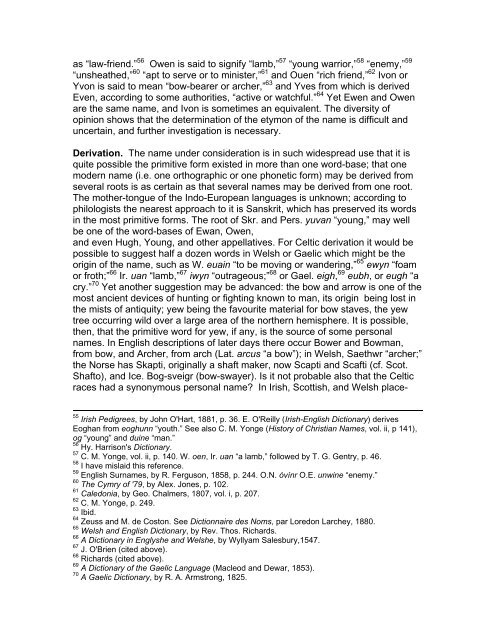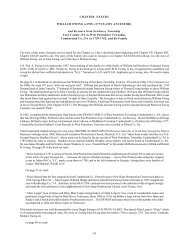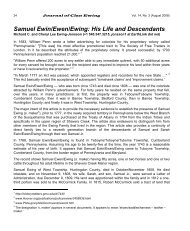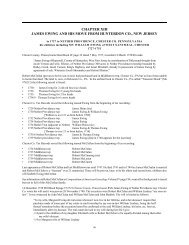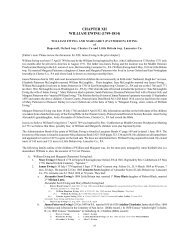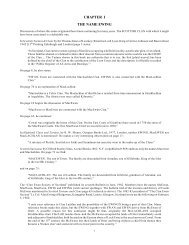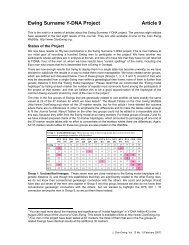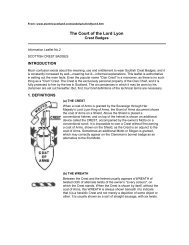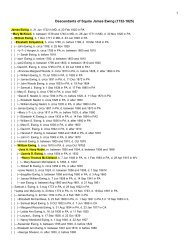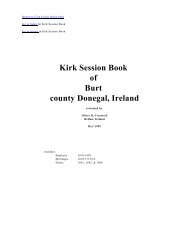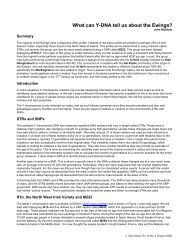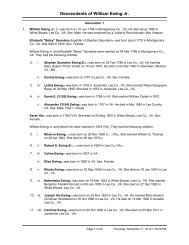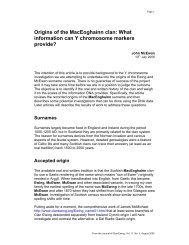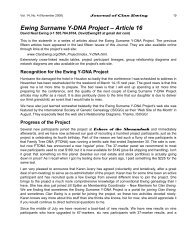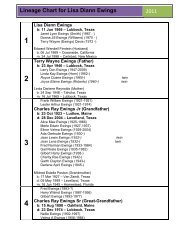Chapter XIV - Ewing Family Association
Chapter XIV - Ewing Family Association
Chapter XIV - Ewing Family Association
You also want an ePaper? Increase the reach of your titles
YUMPU automatically turns print PDFs into web optimized ePapers that Google loves.
as “law-friend.” 56 Owen is said to signify “lamb,” 57 “young warrior,” 58 “enemy,” 59<br />
“unsheathed,” 60 “apt to serve or to minister,” 61 and Ouen “rich friend,” 62 Ivon or<br />
Yvon is said to mean “bow-bearer or archer,” 63 and Yves from which is derived<br />
Even, according to some authorities, “active or watchful.” 64 Yet Ewen and Owen<br />
are the same name, and Ivon is sometimes an equivalent. The diversity of<br />
opinion shows that the determination of the etymon of the name is difficult and<br />
uncertain, and further investigation is necessary.<br />
Derivation. The name under consideration is in such widespread use that it is<br />
quite possible the primitive form existed in more than one word-base; that one<br />
modern name (i.e. one orthographic or one phonetic form) may be derived from<br />
several roots is as certain as that several names may be derived from one root.<br />
The mother-tongue of the Indo-European languages is unknown; according to<br />
philologists the nearest approach to it is Sanskrit, which has preserved its words<br />
in the most primitive forms. The root of Skr. and Pers. yuvan “young,” may well<br />
be one of the word-bases of Ewan, Owen,<br />
and even Hugh, Young, and other appellatives. For Celtic derivation it would be<br />
possible to suggest half a dozen words in Welsh or Gaelic which might be the<br />
origin of the name, such as W. euain “to be moving or wandering,” 65 ewyn “foam<br />
or froth;” 66 Ir. uan “lamb,” 67 iwyn “outrageous;” 68 or Gael. eigh, 69 eubh, or eugh “a<br />
cry.” 70 Yet another suggestion may be advanced: the bow and arrow is one of the<br />
most ancient devices of hunting or fighting known to man, its origin being lost in<br />
the mists of antiquity; yew being the favourite material for bow staves, the yew<br />
tree occurring wild over a large area of the northern hemisphere. It is possible,<br />
then, that the primitive word for yew, if any, is the source of some personal<br />
names. In English descriptions of later days there occur Bower and Bowman,<br />
from bow, and Archer, from arch (Lat. arcus “a bow”); in Welsh, Saethwr “archer;”<br />
the Norse has Skapti, originally a shaft maker, now Scapti and Scafti (cf. Scot.<br />
Shafto), and Ice. Bog-sveigr (bow-swayer). Is it not probable also that the Celtic<br />
races had a synonymous personal name? In Irish, Scottish, and Welsh place-<br />
55 Irish Pedigrees, by John O'Hart, 1881, p. 36. E. O'Reilly (Irish-English Dictionary) derives<br />
Eoghan from eoghunn “youth.” See also C. M. Yonge (History of Christian Names, vol. ii, p 141),<br />
og “young” and duine “man.”<br />
56 Hy. Harrison's Dictionary.<br />
57 C. M. Yonge, vol. ii, p. 140. W. oen, Ir. uan “a lamb,” followed by T. G. Gentry, p. 46.<br />
58 I have mislaid this reference.<br />
59 English Surnames, by R. Ferguson, 1858, p. 244. O.N. óvínr O.E. unwine “enemy.”<br />
60 The Cymry of '79, by Alex. Jones, p. 102.<br />
61 Caledonia, by Geo. Chalmers, 1807, vol. i, p. 207.<br />
62 C. M. Yonge, p. 249.<br />
63 Ibid.<br />
64 Zeuss and M. de Coston. See Dictionnaire des Noms, par Loredon Larchey, 1880.<br />
65 Welsh and English Dictionary, by Rev. Thos. Richards.<br />
66 A Dictionary in Englyshe and Welshe, by Wyllyam Salesbury,1547.<br />
67 J. O'Brien (cited above).<br />
68 Richards (cited above).<br />
69 A Dictionary of the Gaelic Language (Macleod and Dewar, 1853).<br />
70 A Gaelic Dictionary, by R. A. Armstrong, 1825.


